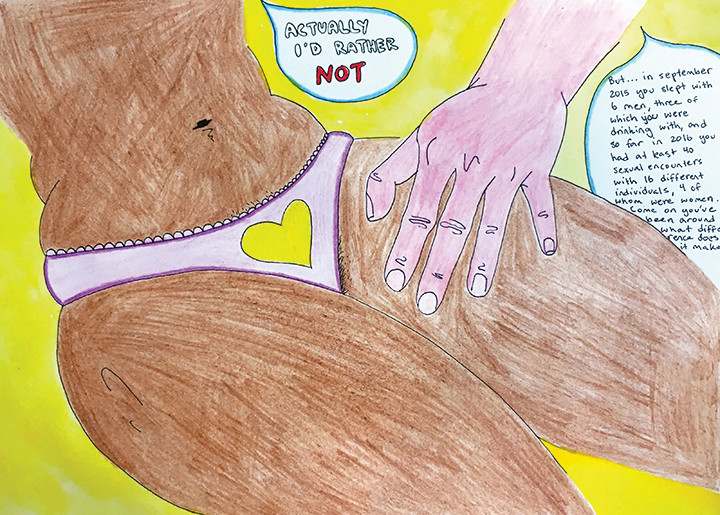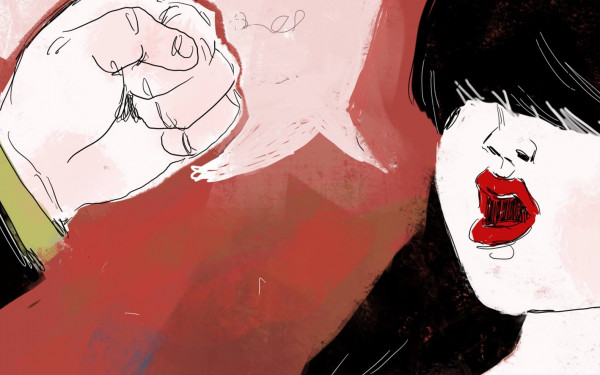Media Needs to Do Better for Survivors
On Oct. 20, 21-year-old Alice Paquet accused Liberal MNA Gerry Sklavounos of having raped her in 2014.
The allegations were made during a vigil for recent sexual assaults at Université Laval, in Quebec City. Once the allegations were made, it did not take long for the media to start digging deep into Paquet’s sexual history—with the Journal de Québec claiming that she had worked as an escort in the past.
While I understand that media outlets strive to publish complete stories, in which all sides of an issue are represented, I believe that digging into Alice Paquet’s, or any other alleged sexual assault survivor’s sexual past, is as unnecessary as it is unacceptable.
Whether Alice Paquet worked as an escort or not, whether she has had dozens of different sexual partners or not, whether she went along with Gerry Sklavounos to a certain extent or not, her body and sexuality are hers and hers alone. Absolutely no one has the right to them without her consent. Sexual consent applies to everybody, and it is essential to respect consent, no matter the situation. And that consent can be retracted at any time during a sexual encounter.
There is no law or rule stating that once you start, you have to finish. That decision rests entirely upon the people involved. One cannot assume that, because their partner did not explicitly refuse their advances, or was drunk, or has had sexual relations with them in the past, they have some kind of inherent, automatic access to the other’s body.
Paquet has been criticized for making slight modifications to her story, or for retracting certain statements. The media has played heavily on that, trying to make her inconsistencies as obvious as possible.
An article by Sophie Durocher, published in the Journal de Montréal a few days after Paquet came forward, lists question upon question about Paquet’s claims, almost making it seem like an interrogation. It is an excellent example of how deeply the media tends to scrutinize alleged assault victims.
Paquet has said she is not sure how clear her refusal of Sklavounos’ advances had been. She has stated that, while her memories of the events were a little fuzzy, she definitely did not say “yes” to everything. And that is an important lesson about consent—if a person does not say yes, it means no.
Paquet does admit that she consented for a while. This applies to many sexual assault cases. Many survivors gave consent up until a certain point, but would have preferred not to go any further. A kiss is not a binding contract. Following someone to their room does not imply that you are handing yourself over to them completely. And, as I’ve said before, consent can be retracted at any time.
The media acted rather tactlessly in releasing information about Paquet’s sexual history to the public, but they are not solely responsible. This whole event ties into a much broader problem, one that has been at the forefront of recent news in Quebec. Following the events at Université Laval and the allegations against Sklavounos, rape culture has been brought up incessantly, and with good reason.
Amongst other things, rape culture perpetuates the harmful myth that assault survivors are to blame for being attacked. The scrutiny that the media and society subject sexual assault survivors to is constant, and sometimes even surpasses the attention given to their attackers—which is problematic, to say the least. Time and time again, society seems to have an easier time believing an alleged attacker’s innocence than a survivor—or even multiple survivors—when they claim to have been assaulted.
We live in a country where people are innocent until proven guilty. It is part of our democratic process, and I understand why the media is trying to present a balanced view of the Sklavounos-Paquet situation. After all, no formal charges have yet been laid on Sklavounos and it is not up to the media to condemn him. But bringing the alleged victim’s sexual past into the equation is not only irrelevant, it seems like an attempt to undermine her credibility.
The general skepticism toward sexual violence survivors who choose to come forth about their assaults is a major problem. In 2014, only five per cent of sex crimes were reported to the police in Canada. Only three out of every 1,000 of those crimes ended in a sentencing. In 2013, 78.1 per cent of sexual assault victims in Quebec were women, which speaks volumes about how present sexism still is in our culture, despite those who might argue otherwise.
Even survivors who do speak out and report their sexual assaults are often subjected to incessant questioning about their previous sexual encounters. Women are repeatedly asked the same ridiculous questions like, “What were you wearing when you were attacked?”
As if showing a little skin is enough to justify someone violating one’s body. As if being dressed “provocatively” constitutes consent. Being covered from head to toe does not mean consent, just as being completely naked does not mean consent. Nothing justifies sexual assault, end of story. Rape survivors are too often made out as having “asked for it,” as if they bear some kind of responsibility in regards to what happened to them.
Sexual assault, by definition, is never the survivor’s fault, but the media’s handling of Alice Paquet’s case reinforces the opposite idea.
I myself do not have the authority to decide whether or not Gerry Sklavounos is guilty, though Paquet’s reports and other claims from ex-colleagues of sexually inappropriate behaviour do not paint him in the brightest light. But I profoundly denounce the way in which Paquet has been represented by the media.
This kind of intrusion upon her intimate past is just further proof that we have a long way to go in terms of eradicating rape culture and sexism.




_600_375_90_s_c1.jpg)

